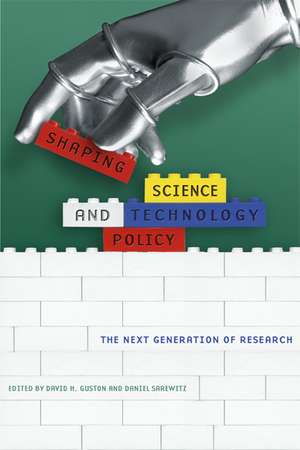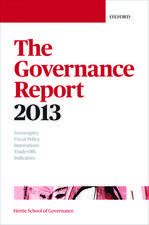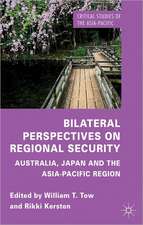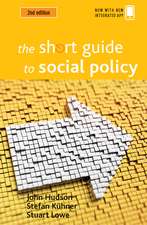Shaping Science and Technology Policy: The Next Generation of Research: Science and Technology in Society
Editat de David H. Guston, Daniel Sarewitzen Limba Engleză Hardback – 3 dec 2006
With scientific progress occurring at a breathtaking pace, science and technology policy has never been more important than it is today. Yet there is a very real lack of public discourse about policy-making, and government involvement in science remains shrouded in both mystery and misunderstanding. Who is making choices about technology policy, and who stands to win or lose from these choices? What criteria are being used to make decisions and why? Does government involvement help or hinder scientific research?
Shaping Science and Technology Policy brings together an exciting and diverse group of emerging scholars, both practitioners and academic experts, to investigate current issues in science and technology policy. Essays explore such topics as globalization, the shifting boundary between public and private, informed consent in human participation in scientific research, intellectual property and university science, and the distribution of the costs and benefits of research.
Contributors: Charlotte Augst, Grant Black, Mark Brown, Kevin Elliott, Patrick Feng, Pamela M. Franklin, Carolyn Gideon, Tené N. Hamilton, Brian A. Jackson, Shobita Parthasarathy, Jason W. Patton, A. Abigail Payne, Bhaven Sampat, Christian Sandvig, Sheryl Winston Smith, Michael Whong-Barr
Shaping Science and Technology Policy brings together an exciting and diverse group of emerging scholars, both practitioners and academic experts, to investigate current issues in science and technology policy. Essays explore such topics as globalization, the shifting boundary between public and private, informed consent in human participation in scientific research, intellectual property and university science, and the distribution of the costs and benefits of research.
Contributors: Charlotte Augst, Grant Black, Mark Brown, Kevin Elliott, Patrick Feng, Pamela M. Franklin, Carolyn Gideon, Tené N. Hamilton, Brian A. Jackson, Shobita Parthasarathy, Jason W. Patton, A. Abigail Payne, Bhaven Sampat, Christian Sandvig, Sheryl Winston Smith, Michael Whong-Barr
Preț: 278.91 lei
Nou
Puncte Express: 418
Preț estimativ în valută:
53.37€ • 55.87$ • 44.16£
53.37€ • 55.87$ • 44.16£
Carte disponibilă
Livrare economică 15-29 martie
Preluare comenzi: 021 569.72.76
Specificații
ISBN-13: 9780299219109
ISBN-10: 0299219100
Pagini: 382
Ilustrații: 20 charts and tables
Dimensiuni: 152 x 229 x 25 mm
Greutate: 0.64 kg
Ediția:1
Editura: University of Wisconsin Press
Colecția University of Wisconsin Press
Seria Science and Technology in Society
ISBN-10: 0299219100
Pagini: 382
Ilustrații: 20 charts and tables
Dimensiuni: 152 x 229 x 25 mm
Greutate: 0.64 kg
Ediția:1
Editura: University of Wisconsin Press
Colecția University of Wisconsin Press
Seria Science and Technology in Society
Recenzii
"A fascinating study of how government policies help shape scientific research, how well governments use research in policymaking, and the challenges in making technology policy more susceptible to democratic deliberation and participation."—Gary C. Bryner, Brigham Young University
"For the first time since Vannevar Bush created the field in 1945, a generation of young scholars is turning to science policy as a place to build long-term careers. Their voices often differ from the scientific leaders with decades of laboratory experience that they are replacing. They are often more attuned to societal concerns, more aware of the challenges of globalization, and more sensitive to the nuances and complexities of science policy in the twenty-first century. This book introduces us to some of their best and brightest minds."—Clark Miller, University of Wisconsin–Madison
"For the first time since Vannevar Bush created the field in 1945, a generation of young scholars is turning to science policy as a place to build long-term careers. Their voices often differ from the scientific leaders with decades of laboratory experience that they are replacing. They are often more attuned to societal concerns, more aware of the challenges of globalization, and more sensitive to the nuances and complexities of science policy in the twenty-first century. This book introduces us to some of their best and brightest minds."—Clark Miller, University of Wisconsin–Madison
Notă biografică
David H. Guston is professor of political science and associate director of the Consortium for Science, Policy, and Outcomes at Arizona State University. He is the author of Between Politics and Science, winner of the American Political Science Association's Don K. Price Award. Daniel Sarewitz is professor of science and society and director of the Consortium for Science, Policy, and Outcomes at Arizona State University. His books include Frontiers of Illusion: Science, Technology and Politics of Progress.
Descriere
With scientific progress occurring at a breathtaking pace, science and technology policy has never been more important than it is today. Yet there is a very real lack of public discourse about policy-making, and government involvement in science remains shrouded in both mystery and misunderstanding. Who is making choices about technology policy, and who stands to win or lose from these choices? What criteria are being used to make decisions and why? Does government involvement help or hinder scientific research?
Shaping Science and Technology Policy brings together an exciting and diverse group of emerging scholars, both practitioners and academic experts, to investigate current issues in science and technology policy. Essays explore such topics as globalization, the shifting boundary between public and private, informed consent in human participation in scientific research, intellectual property and university science, and the distribution of the costs and benefits of research.
Contributors: Charlotte Augst, Grant Black, Mark Brown, Kevin Elliott, Patrick Feng, Pamela M. Franklin, Carolyn Gideon, Tené N. Hamilton, Brian A. Jackson, Shobita Parthasarathy, Jason W. Patton, A. Abigail Payne, Bhaven Sampat, Christian Sandvig, Sheryl Winston Smith, Michael Whong-Barr
Shaping Science and Technology Policy brings together an exciting and diverse group of emerging scholars, both practitioners and academic experts, to investigate current issues in science and technology policy. Essays explore such topics as globalization, the shifting boundary between public and private, informed consent in human participation in scientific research, intellectual property and university science, and the distribution of the costs and benefits of research.
Contributors: Charlotte Augst, Grant Black, Mark Brown, Kevin Elliott, Patrick Feng, Pamela M. Franklin, Carolyn Gideon, Tené N. Hamilton, Brian A. Jackson, Shobita Parthasarathy, Jason W. Patton, A. Abigail Payne, Bhaven Sampat, Christian Sandvig, Sheryl Winston Smith, Michael Whong-Barr




















